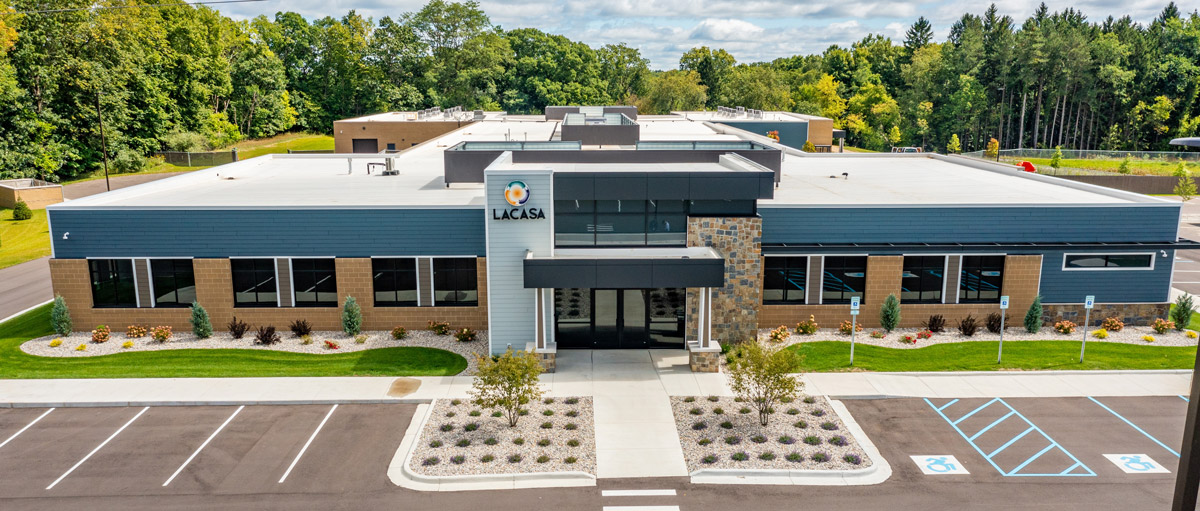JANUARY 12, 2024 — LACASA Center, an independent, locally based nonprofit organization that provides comprehensive services for victims of child abuse, domestic violence and sexual violence, has relocated to a newly constructed facility on Tooley Road in Howell.
“We have completed a phased move to our new forever home,” said LACASA President and CEO Bobette Schrandt. “Our organization has been grappling with severe overcrowding for years. We have been eagerly anticipating the completion of this move, which will enhance every aspect of the way we provide services for victims, survivors and their families.”
The new facility is a culmination of intensive exploratory and project initiation phases accomplished by the organization’s board of directors, Schrandt said. Plans to identify a building site and construct a new facility began in 2018. Since then, the agency has raised more than $12.1 million from key philanthropic donors and charitable foundations during the project’s private fundraising phase. The total facility cost is $15 million.
“We have now begun the public phase of our fundraising campaign,” Schrandt said, “when we will ask members of our community to stand with victims and survivors and support LACASA’s new facility. The public can help by making financial donations to cover essential needs at the shelter and throughout our facility areas—from larger items like furnishing accents and décor to smaller items like kitchen supplies and bedding sets.”
The new center is designed to create an empowering environment for abuse victims and survivors, Schrandt said. Unlike the current shelter, which housed three people to a room and required six people to share a bathroom, the new Crisis Shelter features private studio rooms with small kitchenettes and ensuite baths.
“The more we learn about trauma, the more we understand that thrusting people into crowded living situations that lack privacy creates more trauma,” said Schrandt.
LACASA’s new Crisis Shelter includes an expansive dining room, a commercial communal kitchen, tranquil common areas, laundry facilities, a designated teen room, a children’s activity area, and an outside playground with seating areas for parents and families.
The shelter’s Safe Pet Place has been expanded to comfortably accommodate victims’ pets. A spacious dog run area enables victims and their children to enjoy outdoor time with their canine companions.
“LACASA is leading the way in reimagining and redefining the future of organizations that serve abuse victims and survivors,” said Pat Claffey, chair of the LACASA board of directors.
“This innovative, one-of-a-kind facility is designed to foster self-worth, self-respect, and self-empowerment for victims of abuse,” Claffey said. “The modern, spacious, light-filled environment provides a welcoming, comforting, and dignified setting for victims and their families.”
Since LACASA was first established in 1981, the organization’s services and programs have continued to expand, based on community need, said Schrandt.
“The number of shelter residents and agency clients seeking critical services has increased each year,” Schrandt said. “Growth in every area of our organization has exceeded the space needed for us to operate efficiently and effectively.
“One of our biggest concerns in recent years has been shelter overcrowding,” said Schrandt. “When our Crisis Shelter reaches its residential capacity, we do not turn away victims. Instead, we arrange secure off-site hoteling for victims and their families until space opens in our shelter. This dramatically increases the costs we incur to keep these families safe.”
Last year, the cost for LACASA to provide temporary off-site hoteling and meals for victims and their children exceeded $50,000.
LACASA’s new Crisis Shelter is designed to accommodate 56 residents, which more than doubles the current facility’s capacity.
During its four decades of growth, LACASA has become the only agency of its kind in Michigan—and one of just a few in the nation—that provides all services for abuse victims under one roof.
“This far-sighted approach reduces trauma for victims and their families as they recover from trauma and rebuild their lives,” Schrandt said. “It also makes sound economic sense for the community by eliminating duplicate facility costs and operational expenses.”
LACASA provides services for more than 5,000 victims and survivors each year, and offers more than 35 programs and services for victims, survivors, their families, and the community at large.
The agency’s new center is thoughtfully designed to provide adequate space for all its critical services, said Schrandt.
LACASA’s new Sexual Assault Response Center unit includes two sexual assault forensic examination rooms, a post-exam bathroom and shower facility, a dedicated office for LACASA’s Sexual Assault Nurse Examiners, as well as a private waiting area for family members and friends.
The agency’s Child Advocacy Center features its own entrance and access to two forensic Child Abuse Response Effort (CARE) interview rooms with private family waiting rooms; children’s counseling and activity areas, as well as a sensory playground for children with special needs.
New client-service areas include defined spaces for individual counseling sessions, support group meetings, and legal advocacy services, as well as conference rooms for staff and community meetings, classes, and training sessions.
Another positive for the agency is that staff members will have the proper space to perform their work. “Our staff has tripled in size and we employ more than 70 people,” Schrandt said. “The new center will enable our employees to have dedicated workspaces, rather than sharing desks with multiple people in confined quarters.”
Designated office spaces have been created for LACASA’s 24/7 Helpline advocates, Child Abuse Prevention (CAP) Council, Court Appointed Special Advocates (CASA) program, Transitional Supportive Housing program, Healthy Families program, Social Change Department, and Parenting Education program.
LACASA’s new forever home is located a mile away from its current location on West Grand River Avenue and sits on a 20-acre parcel of land across the street from the Livingston County EMS headquarters. The new facility is 50,000 square feet.
“We selected this site to ensure the organization would never again be landlocked and unable to expand its service facilities or parking areas for clients and staff,” said Schrandt.
A significant benefit of this move, Schrandt said, is that the new center will be equipped with highly-advanced technology and security systems.
“When our current shelter was being planned in 1999, we never could have anticipated how digital and mobile communication systems would change our lives and require complex safeguards to protect from data breaches and security system attacks,” said Schrandt.
As LACASA completes its move, Schrandt said, “The generosity of private donors and foundations who have funded the new facility is truly heartwarming. We cannot express the depth of our gratitude to the donors who recognized the need to lead the way in empowering victims and survivors as they recover from trauma and rewrite their life stories.”
The agency’s current 14,000 square foot Grand River Avenue facility was recently put up for sale and an offer is pending on the two-acre site.
LACASA began as a grassroots organization in 1979, with local citizens providing private housing and advocacy services for domestic violence victims and their children. Two years later, the nonprofit officially was established as the Livingston Area Council Against Spousal Abuse (LACASA). The organization quickly expanded to include services for victims of child abuse and sexual assault. Because the legal name no longer accurately represented the organization’s full range of services, the agency officially changed its name to simply LACASA in 2012.
To learn more about LACASA’s new forever home and how to help local abuse victims and survivors, visit lacasacenter.org/tooley-road/




